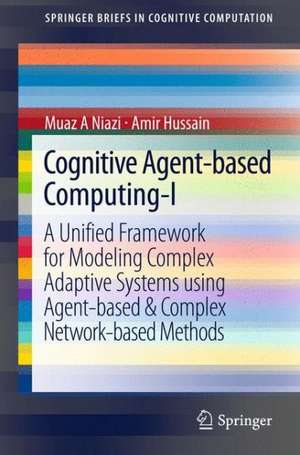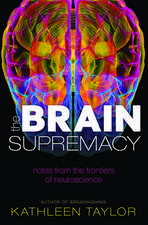Cognitive Agent-based Computing-I: A Unified Framework for Modeling Complex Adaptive Systems using Agent-based & Complex Network-based Methods: SpringerBriefs in Cognitive Computation
Autor Muaz A. Niazi, Amir Hussainen Limba Engleză Paperback – 30 oct 2012
Preț: 376.04 lei
Nou
Puncte Express: 564
Preț estimativ în valută:
71.96€ • 74.85$ • 59.41£
71.96€ • 74.85$ • 59.41£
Carte tipărită la comandă
Livrare economică 14-28 aprilie
Preluare comenzi: 021 569.72.76
Specificații
ISBN-13: 9789400738515
ISBN-10: 940073851X
Pagini: 72
Ilustrații: XIV, 55 p. 9 illus., 7 illus. in color.
Dimensiuni: 155 x 235 x 4 mm
Greutate: 0.13 kg
Ediția:2013
Editura: SPRINGER NETHERLANDS
Colecția Springer
Seria SpringerBriefs in Cognitive Computation
Locul publicării:Dordrecht, Netherlands
ISBN-10: 940073851X
Pagini: 72
Ilustrații: XIV, 55 p. 9 illus., 7 illus. in color.
Dimensiuni: 155 x 235 x 4 mm
Greutate: 0.13 kg
Ediția:2013
Editura: SPRINGER NETHERLANDS
Colecția Springer
Seria SpringerBriefs in Cognitive Computation
Locul publicării:Dordrecht, Netherlands
Public țintă
ResearchCuprins
1. Introduction
1.1 About the Agent Concept
1.2 A Framework for Complex Adaptive Systems
1.3 Modeling CAS
1.4 Motivation
1.5 Aims and Objectives
1.6 Overview of the Briefs
References
2. A Unified Framework
2.1 Overview of the Proposed Framework
2.2 Proposed Framework Levels Formulated in Terms of CAS Study Objectives
2.3 Proposed Framework Levels Formulated in Relation to Available Data Types
2.4 Overview of the Rest of the Parts
2.4.1 Overview of Case Studies
2.4.2 Outline of the Briefs
References
3. Complex Adaptive Systems
3.1 Overview
3.2 Complex Adaptive Systems (CAS)
3.2.1 The Seven Basics of CAS
3.2.2 Emergence
3.3 Examples of CAS
3.3.1 Natural CAS Example 1: CAS in Plants
3.3.2 Natural CAS Example 2: CAS in Social Systems
3.3.3 Artificial CAS Example 1: Complex Adaptive Communication Networks
3.3.4 Artificial CAS Example 2: Simulation of Flocking Boids
References
4. Modeling CAS
4.1 Agent-based Modeling and Agent-based Computing
4.1.1 Agent-oriented Programming
4.1.2 Multi-agent Oriented Programming
4.1.3 Agent-based or Massively Multiagent Modeling
4.1.4 Benefits of Agent-based Thinking
4.2 A Review of an Agent-based Tool
4.2.1 NetLogo Simulation: An Overview
4.3 Verification and Validation of Simulation Models
4.3.1 Overview
4.3.2 Verification and Validation of ABMs
4.3.3 Related Work on V&V of ABM
4.4 Overview of Communication Network Simulators
4.4.1 Simulation of WSNs
4.4.2 Simulation of P2P Networks
4.4.3 Simulation of Robotic Swarms
4.4.4 ABM for Complex Communication Networks Simulation
4.5 Complex Network Modeling
4.5.1 Complex Network Methods
4.5.2 Theoretical Basis
4.5.3 Centralities and Other Quantitative Measures
4.5.4 Centrality Measures
4.5.5 Software Tools for Complex Networks
4.6 Conclusions
References
Index
1.1 About the Agent Concept
1.2 A Framework for Complex Adaptive Systems
1.3 Modeling CAS
1.4 Motivation
1.5 Aims and Objectives
1.6 Overview of the Briefs
References
2. A Unified Framework
2.1 Overview of the Proposed Framework
2.2 Proposed Framework Levels Formulated in Terms of CAS Study Objectives
2.3 Proposed Framework Levels Formulated in Relation to Available Data Types
2.4 Overview of the Rest of the Parts
2.4.1 Overview of Case Studies
2.4.2 Outline of the Briefs
References
3. Complex Adaptive Systems
3.1 Overview
3.2 Complex Adaptive Systems (CAS)
3.2.1 The Seven Basics of CAS
3.2.2 Emergence
3.3 Examples of CAS
3.3.1 Natural CAS Example 1: CAS in Plants
3.3.2 Natural CAS Example 2: CAS in Social Systems
3.3.3 Artificial CAS Example 1: Complex Adaptive Communication Networks
3.3.4 Artificial CAS Example 2: Simulation of Flocking Boids
References
4. Modeling CAS
4.1 Agent-based Modeling and Agent-based Computing
4.1.1 Agent-oriented Programming
4.1.2 Multi-agent Oriented Programming
4.1.3 Agent-based or Massively Multiagent Modeling
4.1.4 Benefits of Agent-based Thinking
4.2 A Review of an Agent-based Tool
4.2.1 NetLogo Simulation: An Overview
4.3 Verification and Validation of Simulation Models
4.3.1 Overview
4.3.2 Verification and Validation of ABMs
4.3.3 Related Work on V&V of ABM
4.4 Overview of Communication Network Simulators
4.4.1 Simulation of WSNs
4.4.2 Simulation of P2P Networks
4.4.3 Simulation of Robotic Swarms
4.4.4 ABM for Complex Communication Networks Simulation
4.5 Complex Network Modeling
4.5.1 Complex Network Methods
4.5.2 Theoretical Basis
4.5.3 Centralities and Other Quantitative Measures
4.5.4 Centrality Measures
4.5.5 Software Tools for Complex Networks
4.6 Conclusions
References
Index
Textul de pe ultima copertă
Complex Systems are made up of numerous interacting sub-components. Non-linear interactions of these components or agents give rise to emergent behavior observable at the global scale. Agent-based modeling
and simulation is a proven paradigm which has previously been used for effective computational modeling of complex systems in various domains. Because of its popular use across different scientific domains, research in agent-based modeling has primarily been
vertical in nature.
The goal of this book is to provide a single hands-on guide to developing cognitive agent-based models for the exploration of emergence across various types of complex systems. We present practical ideas and
examples for researchers and practitioners for the building of agent-based models using a horizontal approach - applications are demonstrated in a number of exciting domains as diverse as wireless sensors networks, peer-to-peer networks, complex social systems,
research networks and epidemiological HIV.
and simulation is a proven paradigm which has previously been used for effective computational modeling of complex systems in various domains. Because of its popular use across different scientific domains, research in agent-based modeling has primarily been
vertical in nature.
The goal of this book is to provide a single hands-on guide to developing cognitive agent-based models for the exploration of emergence across various types of complex systems. We present practical ideas and
examples for researchers and practitioners for the building of agent-based models using a horizontal approach - applications are demonstrated in a number of exciting domains as diverse as wireless sensors networks, peer-to-peer networks, complex social systems,
research networks and epidemiological HIV.
Caracteristici
Provides a single hands-on guide to developing cognitive agent-based models Present practical ideas and examples for researchers and practitioners Explores the emergence across various types of complex systems Includes supplementary material: sn.pub/extras


















